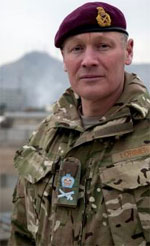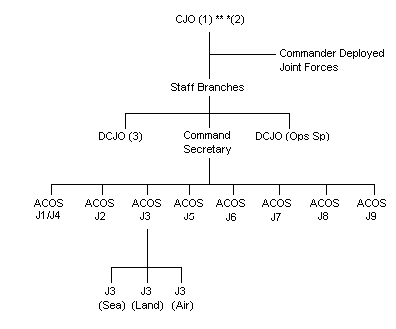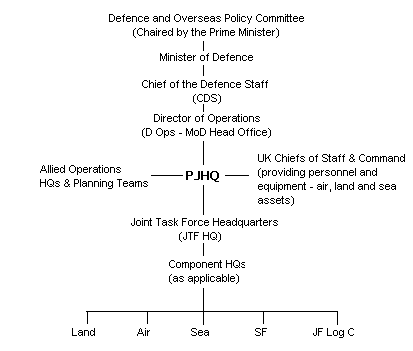
SUMMARY
The UK MoD established a Permanent Joint
Headquarters (PJHQ) at Northwood in Middlesex for joint military operations
on 1 April 1996. This headquarters brought together, on a permanent basis,
intelligence, planning, operational and logistics staffs.
It contains
elements of a rapidly deployable in-theatre Joint Force Headquarters that
has the capability of commanding rapid deployment front line forces.
The establishment of PJHQ was
an attempt to provide a truly joint force headquarters that would remedy the
problems of disruption, duplication and the somewhat 'ad hoc' way in which
previous operations had been organised.
PJHQ is commanded by the Chief of Joint Operations (CJO), (from March 2009
Air Marshal S W Peach CBE BA MPhil DTech FRAeS RAF) who occupies existing
accommodation above and below ground at Northwood in Middlesex. PJHQ is
responsible for planning all UK-led joint, potentially joint, combined and
multinational operations and works in close partnership with MoD Head Office
in the planning of operations and policy formulation, thus ensuring PJHQ is
well placed to implement policy. Having planned the operation, and
contributed advice to Ministers, PJHQ will then conduct such operations.
Amongst its many tasks PJHQ is currently (early 2009) engaged in planning
and conducting UK military involvement in both Afghanistan and Iraq.
When another nation is in the lead, PJHQ exercises operational command of UK
forces deployed on the operation. Being a Permanent Joint Headquarters, PJHQ
provides continuity of experience from the planning phase to the execution
of the operation, and on to post-operation evaluation and learning of
lessons.
Principal additional tasks include
-
Monitoring
designated areas of operational interest
-
Preparing
contingency plans
-
Contributions
to the UK MoD's decision making process
-
Exercise
of operational control of overseas commands (Falklands, Cyprus and
Gibraltar)
-
Managing
its own budget
-
Formulation
of joint warfare doctrine at operational and tactical levels
-
Conducting
joint force exercises
-
Focus
for Joint Rapid Reaction Force planning and exercising

OVERVIEW
OF INTERNATIONAL OPERATIONS
From 1 Aug 1996, PJHQ assumed responsibility
for military operations worldwide.
Non-core functions, such as the day-to-day management of the Overseas
Commands in Cyprus, Falkland Islands, and Gibraltar, are also delegated by
MoD Head Office to the PJHQ. This allows MoD Head Office to concentrate in
particular on policy formulation and strategic direction. As of early 2009 PJHQ has been involved with UK commitments in the following areas:
Afghanistan, Albania, Algeria, Angola, Bosnia, Burundi, East Timor, Eritrea,
Honduras, Iraq, Kosovo, Montenegro,
Montserrat, Mozambique, Sierra Leone, East Zaire, West Zaire (Democratic
Republic of the Congo).
Operations for which PJHQ is not responsible include: UK Strategic Nuclear
Deterrent; Defence of the UK Home Base; Defence of UK Territorial Waters and
Airspace; Support to the Civil Power in Northern Ireland; Counter-terrorism
in the UK and Operations in support of NATO (Article V General War).

PJHQ
COMMANDER - CHIEF OF JOINT OPERATIONS

Lieutenant General Sir John
Lorimer KCB DSO MBE
Lieutenant General John
Lorimer joined the British Army in 1981 and was commissioned into the
Parachute Regiment. He served in all three regular Parachute Regiment
battalions in a number of regimental appointments and attended the Army
Staff College in 1994. This was followed by two years as a company commander
in 1 PARA. On promotion to Lieutenant Colonel, he was posted to the MoD
(Commitments), prior to commanding 3 PARA. During his tenure of command, the
battalion deployed twice to Northern Ireland, as well as taking part in
operations in Iraq in 2003.
On promotion to Colonel, Lieutenant General Lorimer served at US CENTCOM and
attended the Higher Command and Staff Course at the Joint Services Command
and Staff College. He was then posted to the UK’s Permanent Joint
Headquarters (PJHQ) in the appointment of Deputy Assistant Chief of Staff
J3A/Land in April 2004 for 7 months, prior to moving to the J5 (Plans)
Division. He was then selected for promotion to Brigadier and command of 12
Mech Bde in June 2005, taking over command of the Brigade in Basra in South
East Iraq. In 2007 he commanded 12 Mech Bde in Helmand Province, Southern
Afghanistan.
After attending the Royal College of Defence Studies in 2008, Lieutenant
General Lorimer returned to Northwood, this time as ACOS J3. He was then
promoted to Major General in November 2010 and served as the Chief of
Defence Staff’s Strategic Communication Officer and the MoD’s operational
media spokesman. He then assumed command of 3 (UK) Div in June 2011,
training the UK brigades for operations in Afghanistan. He then assumed the
appointment of Deputy Commander ISAF and UK National Contingent Commander in
July 2013 and completed a year-long tour in Kabul. He took over as Chief of
Joint Operations in October 2014.
Lieutenant General Lorimer is married to Philippa and they have sons. His
hobbies include shooting, deer stalking and Scottish rugby, the last of
which causes him no end of frustration. Lieutenant General Lorimer is
President of the Army Winter Sports Association, President of the Army Rugby
Union and President of the Army Parachuting Association. He is also Colonel
Commandant of The Parachute Regiment.

HEADQUARTERS
STRUCTURE
The PJHQ Headquarters at
Northwood brings together about 600 civilian, specialist and tri-service
military staff from across the MoD. The headquarters structure resembles the
normal Divisional organisation, but staff operate within multidisciplinary
groups which are drawn from across the headquarters.
The headquarters must have the capability of supporting a number of
operations simultaneously on behalf of the UK MoD.

Notes:
(1) CJO Chief of Joint Operations
(2) *** Denotes the rank of the incumbent
(3) DCJO – Deputy Chief of Joint Operations; DCJO (Ops Sp) Deputy
Chief of Joint Operations (Operational Support)
(4) ACOS - Assistant Chief of Staff
CJO has a civilian Command Secretary
who provides a wide range of policy, legal, presentational,
financial and civilian human resources advice.
PJHQ Departments
J1 Personnel and Admin
J2 Intelligence
J3 Operations (Sea-Air-Land)
J4 Logistics/Medical
J5 Policy and Crisis Planning
J6 Communication and Information Systems
J7 Joint Training
J8 Finance and Human Resources
J9 Legal
JFHQ High Readiness Deployable Commander
JFLog CHQ Standing Deployable Logistic Component Commander
ANNUAL PJHQ BUDGET
The annual PJHQ budget is in the region of £475 million (2007/08 – Capital +
Resource DEL). The annual running costs of the Headquarters is estimated at
approximately £50 million.
Included in the overall PJHQ budget are the costs of the UK forces in the
Falkland Islands, Cyprus and Gibraltar. Major operations such as the ongoing
operational commitment in Afghanistan and the ongoing commitment in Iraq are
funded separately by way of a supplementary budget, and in almost all cases
this requires government- level approval. Small operations and the cost of
reconnaissance parties are funded from the standard PJHQ budget.

PJHQ
IN THE MOD CHAIN OF COMMAND

Note: The Defence and Overseas Policy Committee (DOPC) is
responsible for the strategic direction of the UK Government’s defence
and overseas policy.
The DOPC is chaired by the Prime Minister and members include the
Secretary of State for Foreign and Commonwealth Affairs (Deputy
Chair); Deputy Prime Minister and First Secretary of State; Chancellor
of the Exchequer; Secretary of State for Defence; Secretary of State
for the Home Department; Secretary of State for International
Development; Secretary of State for Trade and Industry.
If necessary, other ministers, the Heads of the Intelligence Agencies
and the Chief of Defence Staff may be invited to attend.
|